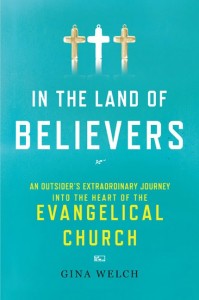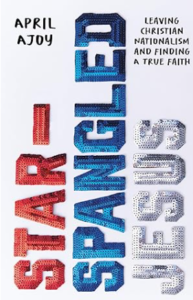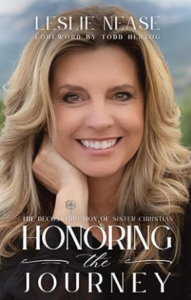 Recently I came across Gina Welch’s insightful look into the evangelical church in her first book “In The Land Of Believers”
Recently I came across Gina Welch’s insightful look into the evangelical church in her first book “In The Land Of Believers”
If a movie were to be made of earlier years it might be titled “I Was A Teenage Fundamentalist”! Yes in my younger days I was a conservative Bible believer. Over the years my spiritual outlook transformed to a much more open, loving, and inclusive world view. Gina’s book brought back memories of my fundamentalist past. She provides an interesting look into the Evangelical mindset from a perspective totally outside the church – she describes her upbringing as a “secular Jew … I have never believed in God”.[1. Land Of Believers page 2]
“In order to know Evangelicals – to learn who they are when they don’t think they are being watched – I decided to masquerade as one,” writes Gina, “I went undercover at Jerry Falwell’s Thomas Road Baptist Church in Lynchburg, Virginia.” [2. from Gina Welch’s website ]
I enjoyed reading Gina’s fresh takes on the Evangelical doctrine. Exposed to the teaching in classes, she was unfazed. “if Jesus was going to go to the trouble of dying for our sins, he might be generous enough to save even the cynics,” she writes. “And I also thought pawning one’s punishment off on Jesus was a peculiar kind of absolution. What about owning up to mistakes? What about conscience?”[3. Land Of Believers page 19]
A favorite tactic of mine in my fundamentalist days was to give out CS Lewis “Mere Christianity” – a book meant to convert intellectual skeptics. I read in “Land of the Believers” the same approach was used with Ms Welch. She remained unconvinced. “CS Lewis’s argument seemed to be that our shared understanding of right and wrong, our collective conscience, was proof of God,” she write. “Being a pretty dogmatic evolutionist, and seeing conscience as an advantageous trait that could have developed over time, I was not pursuaded for an instant.”[4. Land Of Believers page 65. I actually still respect and value CS Lewis’ writing, he has many good insights, I just don’t completely agree with his theology]
Gina’s book is not an atheist bashing of the conservative church doctrine, however. Rather by infiltrating the fundamentalist camp, taking their classes, and even going on a mission trip, she gained a new understanding of the Bible Believers. “”Knowing the language – even though I never employed it myself – made me less sensitive to our differences, ” she says. ” I was learning that I didn’t have to pretend to be somebody I wasn’t to get along with Evangelicals. And I liked being around them: they were happy, and their happiness made me want to be happy.”[5. Land Of Believers page 114]
In the end Gina did not become a convert for Jesus, but she did gain a new appreciation for the people she met. After coming clean with her new church friends on her book project, she writes “”I started to confront how wrong it was for me to feign belief in something that other people consider the most serious thing in the universe. … For awhile I thought I wasn’t going to be able to write the book. I came around on the other side of that time thinking that I still had the opportunity to do what I initially set out to do, which was write something that would promote tolerance. To write something that would help people like me feel less nervous about evangelical Christians. To show them how I came to terms with believers.”[6. Land Of Believers page 321]
Gina succeeds in that goal. Her book helped me to see I could still have a relationship with the people of my fundamentalist past, even if our beliefs are quite different. No doubt those acquaintances are still praying for me to “come back to the fold”, and I can see they mean well, yet their fervor will not sway me from the more joyous, more loving, and more liberated spiritual outlook I have now. But that doesn’t mean we can’t still be friends.



